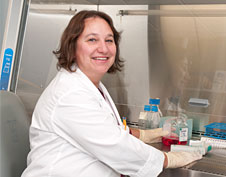
Stephanie Moran
PhD student
University of Otago, Christchurch
“I initially trained as a nurse, but after a few years I wanted to know more about what caused illnesses in people and what disease looked like at a cellular and molecular level, rather than the mechanics of looking after people once they got sick.''
Stephanie Moran is a PhD student at the University of Otago's Centre for Free Radical Research in Christchurch. She is undertaking her thesis studying particular antioxidant proteins present in cells, called peroxiredoxins, and if these proteins can be used as markers that tell us when our body is under attack by free radicals.
Stephanie says she has worked in a range of roles in the health sector, including as a nurse in the areas of haematology and bone marrow transplantation, working for a pharmaceutical company as a sales representative, and as a research nurse in Phase I clinical trials.
She says her current work is rewarding because it could contribute to a better understanding of certain diseases, and hopefully provide insight into improved treatment options in future.
Stephanie says our bodies generate oxygen free radicals as a consequence of normal metabolism. If excess free radical molecules build up in the system, especially during illness, it causes a state known as oxidative stress and this can result in cellular damage. However, there is a sophisticated network of antioxidant proteins in the body which work to remove these potentially harmful molecules.
In simple terms, Stephanie's thesis involves trying to determine what happens to the peroxiredoxins in cells when antioxidant systems are placed under stress. She says a lot of work has been published on discovering how peroxiredoxins work but little has been done measuring them in action in the body.
Stephanie will be measuring changes to peroxiredoxins in inflammatory conditions such as diabetes and sepsis, and also in cancer cells that have been exposed to anti-cancer drugs. In this later system, peroxiredoxin changes may provide insight into the effectiveness of treatment in individual patients. There is even the possibility that modifying peroxiredoxins may improve treatment.
Stephanie studied breast cancer genetics for her Master's degree at the University of Otago, Christchurch.
She chose to undertake her PhD at the University of Otago, Christchurch, because of its international reputation of excellence in health science. She was also drawn to the calibre of research staff and supervisors available. Stephanie's PhD project is supervised by Associate Professor Mark Hampton.
